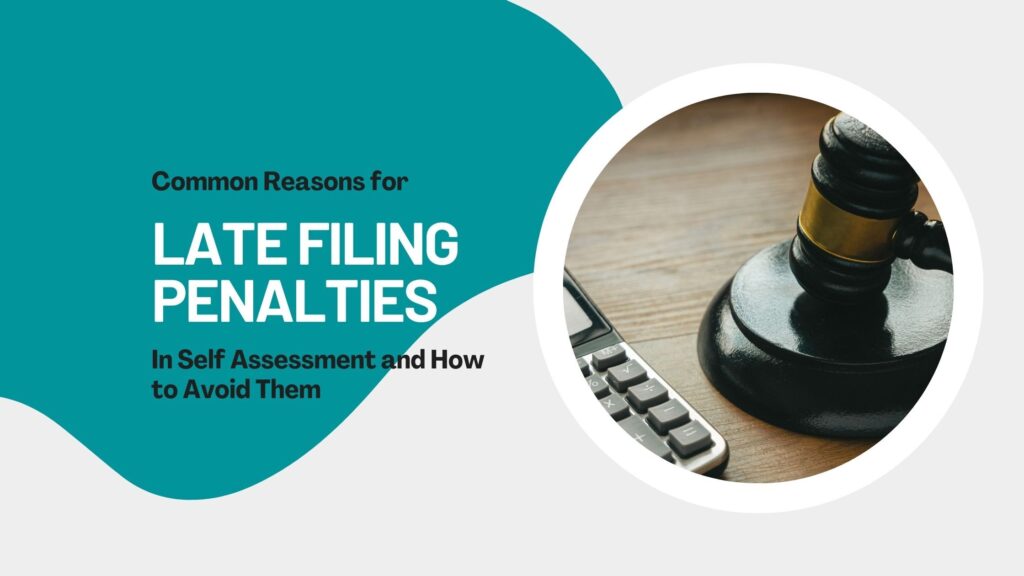Self-assessment is a system where taxpayers are responsible for reporting their income and calculating the tax they owe. This process requires individuals to submit their tax returns and any due payments by specific deadlines. Late filing penalties in self-assessment can be a significant issue for taxpayers, leading to unnecessary fines. These penalties are imposed when tax returns are not submitted by the deadline, adding extra financial burdens. In this article, we’ll explore common reasons for late filing penalties and provide tips on how to avoid them.
What Are Late Filing Penalties in Self Assessment?
Late filing penalties are fines imposed by HMRC when a taxpayer fails to submit their self-assessment tax return by the deadline. These penalties can add up fast, so it’s important to know how they work and how to avoid them. The penalties increase based on how long you delay and can get worse if not dealt with quickly.
Common Reasons for Late Filing Penalties
Late filing penalties can be a costly mistake when it comes to your self-assessment tax return. To help you avoid these fees, let’s explore some of the most common reasons people face penalties.
1. Missed Deadlines
One of the most common reasons for late filing penalties is simply missing the deadlines. Key deadlines to remember include:
- 31st January for online tax returns.
- 31st July for payment on account.
Failing to meet these deadlines results in automatic penalties.
2. Incomplete or Incorrect Information
Accurate record-keeping is crucial for timely and correct tax return submission. But, taxpayers often struggle with misplaced or incomplete documentation. Missing receipts, invoices, or financial statements can cause significant delays as individuals mess up to locate or replace these essential documents. It’s crucial to verify that all information is accurate and complete before submitting.
3. Procrastination and Poor Time Management
Many taxpayers tend to procrastinate, leaving their tax return preparations to the last minute. This can result in rushing through the process, making mistakes, or simply missing the deadline altogether. Poor time management is often the main reason, as people may underestimate how much time they need to gather all the necessary documents and fill out the forms correctly.
4. Complex Financial Situations
Taxpayers with complex financial situations, such as multiple income sources, investments, or foreign income, may find the self-assessment process overwhelming. The complexity can lead to confusion and mistakes, causing delays in submission. Managing these complexities becomes challenging without professional help or a clear understanding.
5. Technical Issues
The increasing use of digital submissions means technical problems can be a challenge. Problems with internet connectivity, software providers, issues with the HMRC online portal, or unfamiliarity with the digital submission process can result in delayed filings.
6. Lack of Awareness
Some individuals are simply unaware of their obligation to file a self-assessment tax return. This is particularly common among newly self-employed individuals or those who have income streams outside of regular employment. Without proper knowledge of the requirements and deadlines, these taxpayers might miss the submission date entirely. If you’re unsure whether you need to file a self-assessment tax return, How to Register for Self-Assessment can guide you through the registration process.
Penalty Structure for Late Filing
The penalty system for late filing of a self-assessment tax return aims to promote timely submissions and discourage procrastination. By understanding how these penalties work, taxpayers can take steps to avoid unnecessary fines.
- One Day Late: If the tax return is filed late, a fixed penalty of £100 is applied immediately after the deadline has passed. This applies even if there is no tax to pay or if the tax due has been paid on time.
- Three Months Late: If the delay goes past three months, extra daily fines are added. Taxpayers are charged £10 a day for up to 90 days, which can total £900. These fines are on top of the initial fixed penalty, making the total £1,000 if not paid quickly.
- Six Months Late: When the delay exceeds six months, an additional fine of £300 is charged or 5% of the tax due—whichever is higher. This is in addition to the penalties already existed.
- Twelve Months Late: If you delay filing your taxes for over 12 months, you’ll be charged a penalty of either £300 or 5% of the tax you owe, whichever is higher. In more serious cases, if HMRC thinks you’re intentionally hiding information, the penalty can be even higher, up to 100% of the tax owed.
How to Avoid Late Filing Penalties
It’s crucial to file your taxes on time to avoid penalties. Here are some tips to help you meet your deadline:
- Set Reminders: Use tools and apps to set reminders for important tax dates. This ensures you won’t miss any deadlines.
- Organise Documents Early: Keep your financial records organised throughout the year to make the filing process smoother and quicker.
- Use HMRC Online Services: HMRC’s online services are designed to make filing easier. Familiarise yourself with the system and take advantage of its features, including the ability to confirm that HMRC has processed your tax return.
- Seek Professional Help: If you’re unsure about any aspect of self-assessment, consider hiring a tax advisor or accountant. Their expertise can save you time and help you avoid expensive errors.
What to Do If You Miss the Filing Deadline
If you miss the filing deadline, take immediate steps to minimise penalties:
- File your return as soon as possible to stop the daily penalties from accumulating.
- Contact HMRC for assistance and to discuss potential penalty reduction options.
Appeals Process for Late Filing Penalties
If you’ve received a late filing penalty, you may be able to appeal it. Here’s what you need to know about the appeals process.
- Using Form SA370: If you believe you have a valid reason for missing the deadline, you can appeal the penalty using Form SA370. Be sure to provide detailed explanations and any supporting documentation.
- Valid Reasons for Appeals: Valid reasons for appeals include unexpected hospitalisation, severe illness, or other unforeseen circumstances. Be honest and thorough in your explanation.
Late filing penalties in self-assessment can be a significant issue for taxpayers, but they are avoidable with proper preparation and awareness. By setting reminders, organising documents, and seeking professional help, you can ensure timely filing and avoid unnecessary fines. Swiftacc can assist you with all these tasks, making the filing process easy and smooth. Our expert team can keep track of your tax deadlines, organise your documents, and give professional advice to avoid penalties.
Frequently Asked Questions
Who needs to file a self-assessment tax return?
You need to file a self-assessment tax return if you are self-employed, have a high income from investments or savings, receive rental income, or have any other untaxed income.
What happens if I miss the self-assessment deadline?
If you miss the deadline, you will incur penalties starting with an automatic fixed penalty of £100 for being one day late. Penalties increase the longer you delay, with additional daily charges for returns that are more than three months late.
How can I avoid late filing penalties?
You can avoid late filing penalties by setting reminders for important tax dates, organising your documents early, utilising HMRC’s online services, and seeking professional help if needed.
Can I appeal against a late filing penalty?
Yes, you can appeal against a late filing penalty using Form SA370 if you believe the penalty has been unfairly issued. Valid reasons for an appeal include unexpected hospitalisation or severe illness.
What should I do if I face technical issues when filing my return?
If you encounter technical issues, contact HMRC support as soon as possible for assistance. Documenting and reporting the issues may also help your case if you need to appeal a penalty.
Where can I find official HMRC resources
Official HMRC resources can be found on their website at gov.uk. It is advisable to refer to these resources for accurate information and guidelines.

